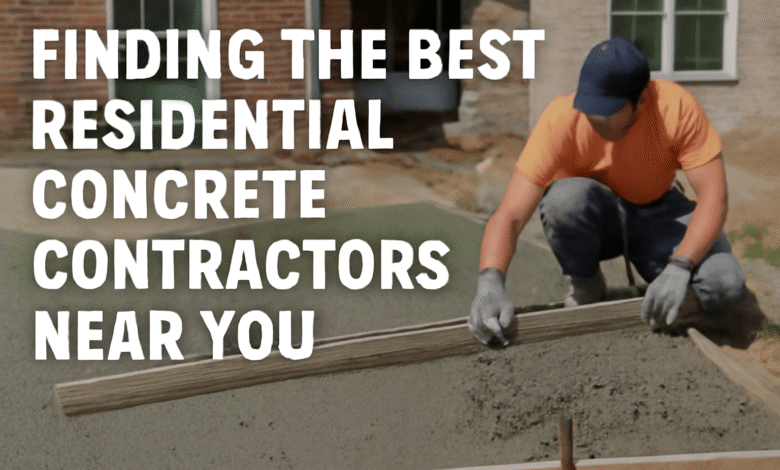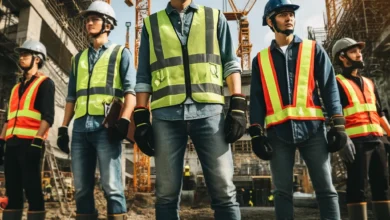Finding the Best Residential Concrete Contractors Near You

When it comes to home construction or renovation projects, one of the most crucial decisions you’ll make is choosing the right contractor. Whether you’re installing a new driveway, building a patio, or repairing your foundation, selecting the best residential concrete contractor can make a significant difference in the outcome of your project. With the wide array of contractors available, it can often feel overwhelming to decide who to hire. However, understanding a few key points and following a practical approach can make this process easier and ensure that you get the quality service you’re looking for.
In this article, we’ll guide you through how to find the best residential concrete contractors near you, what to look for in a contractor, and how to make sure the project goes smoothly. By the end, you’ll be well-equipped to make an informed decision that will benefit your home and your investment.
1. Understanding the Role of a Residential Concrete Contractor
Before diving into the search for the best contractor, it’s essential to understand what a residential concrete contractor does. These professionals specialize in the design, installation, and maintenance of concrete structures in residential areas. This includes everything from driveways, sidewalks, and patios to foundations, retaining walls, and decorative concrete features. A residential concrete contractor should be skilled in working with various concrete types and should have the expertise to handle all phases of the project, including preparation, pouring, curing, and finishing.
A good contractor will work with you to ensure the project meets your specific needs and adheres to local codes and regulations. They should also help you choose the right materials for your project, considering factors like durability, aesthetics, and budget. Whether it’s a simple sidewalk or a complex custom project, a professional contractor will ensure that the job is done right the first time.
2. How to Search for the Right Contractor
Finding the right contractor begins with research. While word of mouth and recommendations from friends and family are valuable, the internet has made it easier than ever to find quality contractors in your area. Start by using the search term Residential Concrete Contractors Near Me to narrow down your options. This keyword will give you a list of contractors in your local area, making it easier to find professionals who can service your specific location.
When browsing potential contractors, take note of their service areas and check whether they specialize in the type of project you’re planning. Some contractors may focus exclusively on decorative concrete, while others may specialize in larger structural work. It’s essential to make sure the contractor you choose has experience with your specific needs.
3. Checking Experience and Credentials
Experience is a critical factor when choosing a concrete contractor. The longer a contractor has been in business, the more likely they are to understand the intricacies of the trade and be familiar with various materials, techniques, and local regulations. As you research potential contractors, be sure to look for one with several years of experience under their belt, especially in residential projects similar to yours.
Additionally, ask about the contractor’s credentials. Ensure they are licensed and insured, as these are signs of professionalism and legitimacy. A contractor without proper insurance could leave you liable for any accidents or damages that occur during the job. Check whether they have the necessary permits to complete the project in compliance with local building codes.
4. Reviewing Past Work and Client Testimonials
One of the best ways to evaluate a contractor’s quality is by reviewing their past work. Most reputable contractors will have a portfolio showcasing their previous projects. This portfolio may include images of completed jobs such as driveways, foundations, patios, or other concrete structures. Pay attention to the details of the work. Does it look clean and professional? Are the lines straight, and does the finish look smooth and consistent?
In addition to a portfolio, look for client testimonials or online reviews. Online platforms like Google, Yelp, and social media can offer insight into how satisfied previous clients have been with the contractor’s services. Read through the reviews to get a sense of the contractor’s reliability, communication, and overall work quality. Keep an eye out for any recurring negative comments or patterns. A few negative reviews are normal, but if the majority of the feedback is poor, that could be a red flag.
5. Getting Multiple Estimates
Once you’ve narrowed down your list of potential contractors, it’s essential to get multiple estimates. This step is crucial in ensuring that you are paying a fair price for the job. A reputable contractor will provide a detailed estimate that breaks down the costs for materials, labor, permits, and any additional services.
When comparing estimates, don’t just focus on the lowest price. The quality of the materials used, the time it will take to complete the project, and the contractor’s experience should all factor into your decision. A contractor offering an exceptionally low price might be cutting corners, which could result in subpar work that requires repairs in the future.
6. Communication and Customer Service
Effective communication is key when working with any contractor. A good contractor will be responsive to your calls and emails and will take the time to answer any questions you have about the project. Before hiring, pay attention to how quickly and professionally they respond to your inquiries. If they are difficult to reach or fail to provide clear answers, it could be a sign that they may not be the right fit for your project.
Additionally, assess their customer service throughout the hiring process. Are they willing to listen to your ideas and concerns? Do they provide clear explanations of their process, pricing, and timeline? A contractor who values communication and customer satisfaction is likely to provide a much better experience throughout the course of your project.
7. Ensuring a Proper Contract
Once you’ve chosen a contractor, the next step is to sign a contract. A written agreement is essential for protecting both you and the contractor. The contract should outline all the details of the project, including the scope of work, materials, timeline, and payment schedule. Be sure to read the contract carefully before signing, and don’t hesitate to ask for clarification if anything is unclear.
The contract should also include provisions for handling unexpected circumstances, such as delays, weather-related issues, or changes in the scope of work. A clear and thorough contract helps prevent misunderstandings and ensures that both parties are on the same page.
8. Project Timeline and Delivery
Discuss the timeline for the project with your contractor before work begins. An experienced concrete contractor should be able to give you an estimated start and completion date based on the specifics of your project. Keep in mind that weather and other external factors can sometimes affect the timeline, but a good contractor will keep you informed if any delays occur.
Additionally, ask about the daily work schedule. Will the team be working every day, or will there be breaks in between? Knowing the timeline and daily schedule helps you plan accordingly and ensures that you’re not left in the dark about the project’s progress.
9. Maintenance and Warranty
Once your concrete project is complete, it’s important to know how to maintain it for long-term durability. A good residential concrete contractor will provide you with maintenance tips and advice on how to care for your concrete surfaces. Whether it’s sealing your driveway or cleaning your patio, proper maintenance can extend the life of your concrete and keep it looking great for years to come.
In addition to maintenance advice, ask about warranties for the work completed. A reputable contractor should stand behind their work and offer a warranty that covers any defects or issues that arise within a reasonable time frame. Make sure you understand the terms of the warranty before signing the contract.
10. Final Thoughts
Hiring the right residential concrete contractor can be the difference between a smooth, successful project and a frustrating, costly one. By following the steps outlined in this article – including researching contractors, checking their experience, and getting multiple estimates – you can ensure that your project is in good hands. Remember to prioritize communication, a clear contract, and a realistic timeline to ensure that your concrete project goes as smoothly as possible.
When you are ready to move forward, take your time choosing the best contractor for your needs. By making informed decisions, you’ll not only achieve a high-quality result, but you’ll also have peace of mind knowing that your investment is protected.
For your concrete needs, make sure to visit https://1stconcretecontractor.com/ to find the right contractor in your area!


